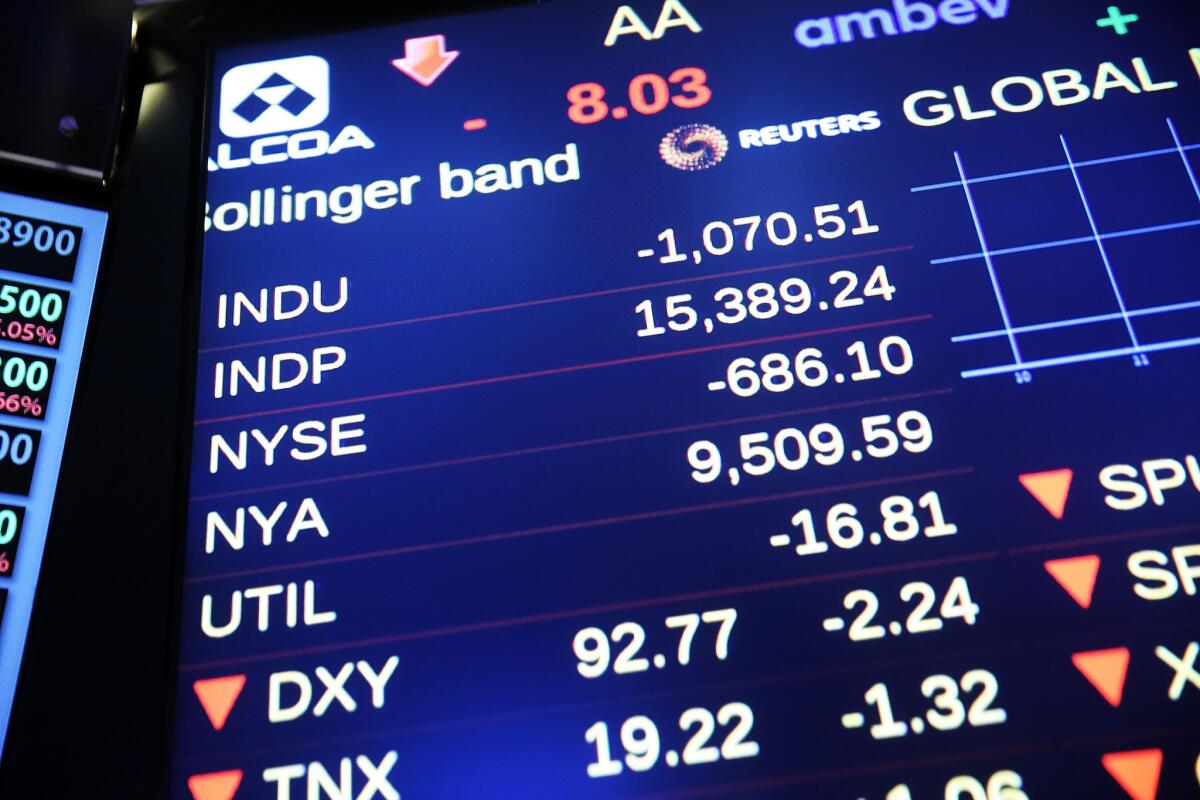Q&A: How the global economic turmoil will play out in the U.S.

A screen on the floor of the New York Stock Exchange shows the the Dow Jones industrial average briefly dropping more than 1,000 points in morning trading on Aug. 24.
- Share via
Reporting from Washington — Here’s a look at why global stock markets are falling and what it might mean for American workers and investors.
What is causing the global stock market meltdown?
The stock market plunge was triggered by China’s move two weeks ago to devalue its currency. Although Beijing said the action was taken in line with a policy change to make its exchange rate more market-driven, many investors and analysts took the announcement as an indication that the Chinese economy is slowing more sharply than previously thought.
Since then those fears have been intensified by economic reports from China showing a worse-than-expected decline in exports and industrial production, as well as a plunge in China’s stock market, which has exacerbated worries about the Chinese government’s management of its financial market and economy.
Investors have good reason to be concerned about a sharp slowing in China’s growth. The Asian country is the world’s second-largest economy, behind the United States, and has been a major engine of global growth over the last decade. China is the biggest trading partner for most countries in Asia, the fastest-growing region, and it is the world’s biggest consumer of copper and many other commodities, which are important to countries around the globe.
SIGN UP for the free California Inc. business newsletter >>
Some analysts also say the Federal Reserve is partly to blame for the accelerated fall in stocks since Wednesday. That’s when minutes of the Fed’s last meeting were released, and they showed the central bank remains deeply divided about whether to begin raising interest rates in September, as many had been expecting. That has added to the uncertainty and anxiousness in financial markets around the world.
What does the market plunge say about the global economy?
There is no question that global economic growth has been disappointing in the last couple of years. Major economies around the world, developed and developing, have generally been performing under expectations.
The European economy has struggled under the weight of debt problems in Greece and other imbalances on the continent. Japan remains mired in a two-decade-long slump amid weak spending and heavy debt. China’s growth has slowed, helping further weaken other emerging economies such as Brazil and Indonesia. The U.S. has been a major driver of the global economy but has fallen short of the robust pickup that many had predicted last year.
What does this mean for the U.S. economy?
At this point, few experts are predicting that the market sell-off will derail America’s six-year-long economic expansion. Analysts point out that fewer Americans today own stocks than during the 2008 financial crisis, and corporate America has a lot of cash in hand, as many companies had a string of record profits during the recovery.
There is also a silver lining in the accompanying fall in oil prices. The U.S. is a net importer of oil, and with investors worried about weaker demand from China and elsewhere, the price of oil has fallen to fresh 6-year lows. Cheaper fuel means more money in consumers’ pockets to spend on other things, and it should also help many businesses cut their energy costs.
Still, a prolonged pullback in financial markets will weigh on business and consumer confidence, and that could translate into weaker investment, hiring and spending. And if China’s economy continues to show it is facing a deep slowdown, that will fan fears, crimp global trade and further hamper many other economies, which in turn will hurt American exports and manufacturing.
How will the Chinese and U.S. respond?
Chinese leaders are expected to take steps to quell the panic, most likely by injecting new liquidity into its financial system to boost lending and lift confidence in its shaky markets. Specifically, analysts say Beijing may be planning to reduce reserve requirements for banks, making more funds available for loans.
The latest market turmoil has raised the odds that the Federal Reserve will delay plans to raise its benchmark interest rate next month. Some analysts think the central bank could telegraph that in the coming days, before its next meeting in mid-September, as a way of helping calm markets. The U.S. Treasury Department says it “is monitoring ongoing market developments and is in regular communication with its regulatory partners and market participants.”
With many currencies also tumbling, what are the risks of an Asian financial crisis like the one in 1997?
Although currencies in Asia are down significantly against the dollar, most analysts don’t see a full-blown crisis like the one in 1997 when the Thai baht and the South Korean won plunged and helped trigger a deep slump in the Asian region. For one thing, Asian currencies haven’t come under speculative attacks. Many of these Asian economies today have considerable foreign-exchange reserves and stronger banking systems in place.
Nor are experts worried that China’s market problems will trigger a global financial crisis as the Lehman Bros. collapse did in 2008. China’s stock market is fairly contained – only a small share of the population owns stocks -- and its financial system isn’t linked closely to banks and other financial institutions in the U.S. and Europe, which are better capitalized than in 2008. Beyond that, many analysts believe that China’s economic growth, while slowing, won’t tumble into a hard landing. Although China’s manufacturing sector is struggling with excess capacity, its larger service industry is doing better and problems have eased in the country’s overheated real estate sector.
NEWSLETTER: Get the day’s top headlines from Times Editor Davan Maharaj >>
MORE ON STOCK MARKETS:
Tech sector faces challenges if the stock market slide continues
Why stocks are tumbling six years into the bull market
Stock market suffers worst one-day drop since 2008
More to Read
Inside the business of entertainment
The Wide Shot brings you news, analysis and insights on everything from streaming wars to production — and what it all means for the future.
You may occasionally receive promotional content from the Los Angeles Times.











